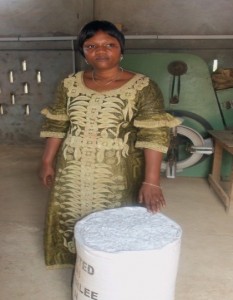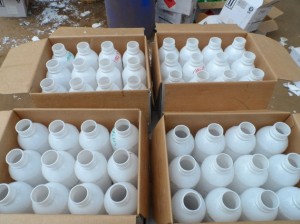Learning from the AIRS Ghana recycling experience, AIRS Benin found a local partner, Waste Recovery and Recycling Center (CREVAD), to recycle empty insecticide bottles.
You might not expect a malaria prevention project to concern itself with being green, but AIRS takes environmental protection seriously. If insecticide used for indoor residual spraying (IRS) is not kept in a secure place and properly disposed of, it could seep into the ground or people could collect plastic insecticide bottles for household use. To prevent human contact, empty insecticide packaging is usually incinerated or dumped into a landfill. But, for the first time in 2013, Benin recycled empty organophosphate insecticide bottles.
In 2013, Benin used an insecticide packaged in plastic bottles. Learning from the AIRS Ghana recycling experience, AIRS Benin found a local partner, Waste Recovery and Recycling Center (CREVAD), to recycle empty insecticide bottles.
“By working with AIRS to recycle plastic bottles, we are protecting the environment in our country and providing businesses with sustainable, environmentally friendly materials,” said, CREVAD Manager Marlene Houessou.
CREVAD is located in Pahou 25 kilometers west of the capital, Cotonou. The center has been recycling plastic wastes since 1990; however, the plastic bottles used for the IRS campaign were harder from others plastics processed by the plant. Luckily, CREVAD was able to make adjustments to their machinery that enabled them to recycle the insecticide bottles.
Once recycling is completed in November 2013, 1,490 kg of plastic bottles and caps will be converted into electrical ducts or pavements.
“Local partners like CREVAD are critical to making malaria control in Benin more sustainable, preserving the environment, and providing raw material for new projects,” said Noe Rakotondrajaona, AIRS Benin chief of party.
In Benin, malaria causes 42.8% of outpatient’s consultations and places considerable socio-economic burden to communities. Children who are sick with malaria miss school and parents are unable to work.
Through AIRS, the President’s Malaria Initiative targets communities in northwest Benin and protects those communities from malaria by spraying the inside of homes with insecticide. In 2012, AIRS protected more than 650,000 people from malaria including nearly 18,000 pregnant women and 127,000 children under five in Benin.


